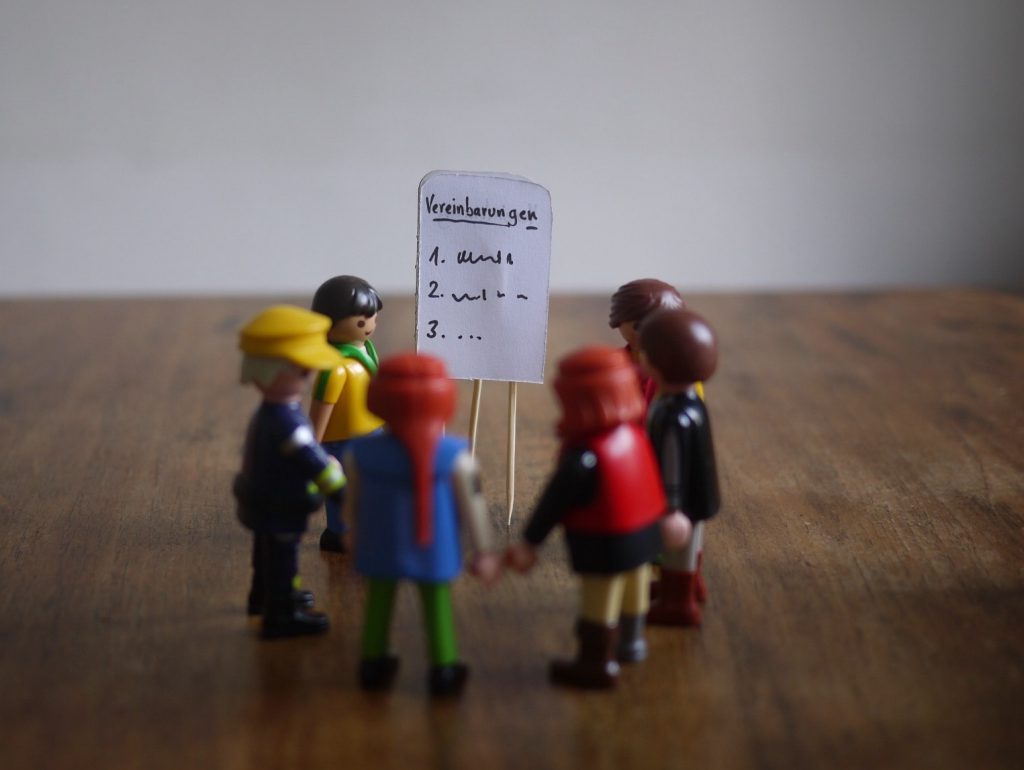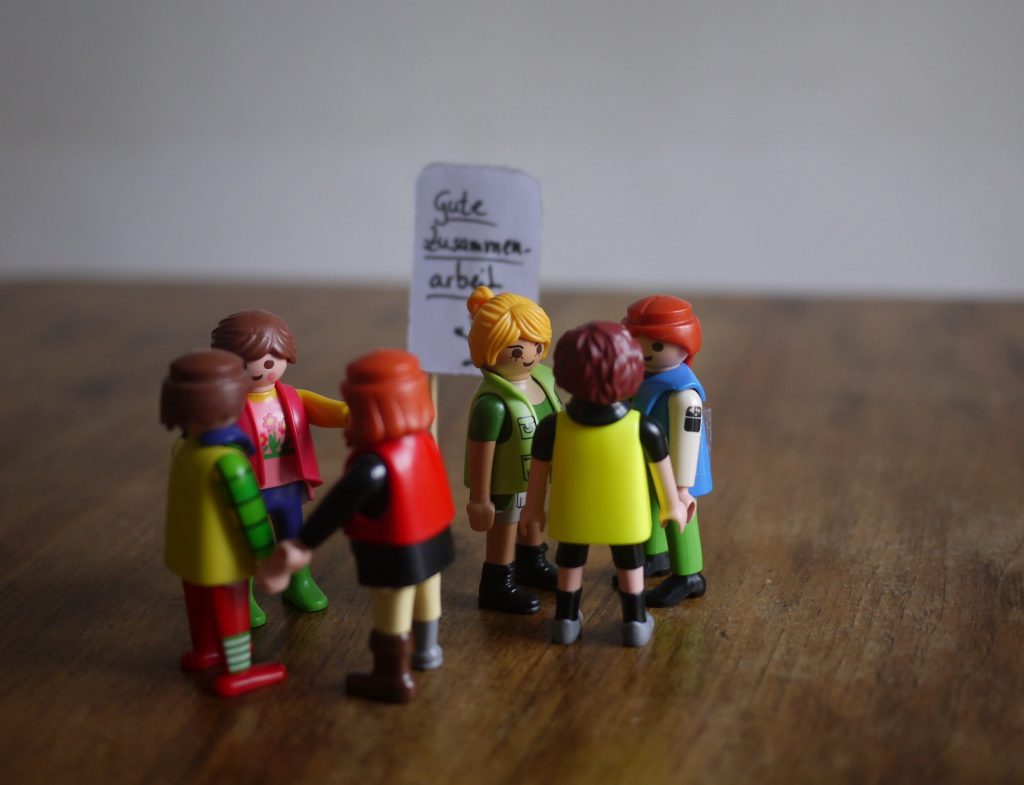Let’s make a deal…
Rudi is pissed off when he sends a message to his colleagues to skip the next meeting. He had worked with a new group for the first time the day before and didn’t feel like being with people at all. Yasmine calls him and asks if she can do something to improve his mood. Rudi briefly outlines the situation he has experienced and is a bit at a loss as to how he should prepare for the next appointment with the group. „But Rudi, then our meeting is just the thing for you!“
Yasemine has experienced the situation in this or a similar way many times before and thinks that it would be good to tap into the wealth of experience of the others in this regard. „And what about the topic Maria is preparing for our meeting?“ asks Rudi on the phone. „That’s right, Maria wanted to talk about agreements at the beginning of training groups. But crises have priority!“ Yasmine placates and adds that the topic might be helpful anyway.
Finding solutions together
The short professional exchange with Yasmine had already had an effect and Rudi was reminded – once again – that just describing difficult or annoying situations can help to find a way of dealing with them. The previously present feeling of having made a mistake and the anger about it had given way to the certainty of being able to share his experiences in a protected setting. He was now looking forward to the meeting. The regular meetings of our colleagues are often used for intervision.
What actually happened?
The course group had already spent several seminar days together and according to the two trainers who had started the course with the group, getting to know each other had worked well. So Rudi had started as always in such a case: introducing himself and giving the participants time to arrive. In this case with two impulse questions, which were answered in turn in the plenary: How did I get here today? What thoughts have accompanied me on the way here? The questions allow the participants to reveal something about themselves and their everyday life, but the dosage and the degree of personal revelation is left up to them.
Usually there is something to laugh about during such a welcome round. Because someone relates a funny experience or an observation made along the way. In Rudi’s group, one participant laughed and said that she had almost been late. „I had a lot of time in the morning. Normally I have to leave as soon as the children leave the flat, cleaned up and equipped with snacks. Since the seminar starts a little later than I normally start work, I still had half an hour to spare. And that is fatal! I then start something quickly and I can almost be sure that I’m missing the time!“ Some others in the group had joined in the laughter or confirmed with a nod that they were quite familiar with this phenomenon. So far so good.
Clarity and structure
Rudi then presented the programme for the day and gave space for questions, which no one took advantage of. From that point on, the atmosphere was a little different, Rudi noted in the reflection. In the time that followed, restlessness and resistance became noticeable again and again. Rudi’s work assignments were questioned by some people. Other participants noticeably did not like this. Misunderstandings arose, instructions were interpreted differently, but nobody asked questions. It seemed as if the group was not very comfortable with each other. This in turn unsettled Rudi. He made an effort to work particularly precisely and cleanly, actively invited questions of understanding and tried to be particularly attentive to perplexed faces in order to be able to react accordingly. „But somehow something was already very wrong,“ Rudi said thoughtfully.
Rules & agreements
By now the others – Yasemine, Paul, Maria and Beate – were aware of Rudi’s difficulties and were happy to share their thoughts with him and in so doing find answers to Rudi’s question: „How should I prepare for the next meeting with the group?“
Rudi sits a little perplexed in the round with his shoulders drooping. Maria, who has accompanied several training courses herself, is curious about the programme that the trainers of the first seminar went through with the training group. „Did you have a exchange with the two trainers? Or do you know what they did?“ Rudi says, „Well, I already know roughly. The course director got information and passed it on to me by phone.“ According to the phone call, the topics were „getting to know each other“, „going through the curriculum together“ and „discussing questions about it, and forming peer groups. Rudi also knew how the colleagues had proceeded methodically at the beginning, after which the picture became a little fuzzier.
How do we want to work together?
„It could be a coincidence now, of course, because I prepared the topic for today, but what I noticed right away: agreements on cooperation were not a topic?“ interjects Maria. Rudi doesn’t know that. Either the info wasn’t passed on to him or the group actually didn’t agree with each other how they would like to organise their cooperation during the course. „But anyway, now that you mention it so specifically, I noticed that the participants seemed to be unsure about what they are allowed to do and what they are not allowed to do. For example, asking questions or questioning work assignments.“
„But I tell them how to work, divide them into small groups and give them work assignments!“ says Beate, „what can’t be clear?“ Maria replies that different degrees of self-organisation are required. In specialised training, the programme is often fixed from the start, there is a clear sequence and work assignments that are worked through together. The more process-oriented the training, the more important it is to discuss rules and necessities for good cooperation. In a course that is supposed to enable participants to work with groups, it makes sense to experience and reflect on such a process.
What do we need for good cooperation?
„It doesn’t have to be elaborate,“ Maria continues. „After the participants already know each other a little and have had their first experience with each other, I ask the group to think about how they imagine future cooperation, what they themselves will contribute to it and what they need from the others to do so.“
Yasemine often integrates questions of this kind into a clarification of expectations she makes at the beginning of working with a group. „I also communicate to the group what I need so that I can work well. For example, that the phones should be on silent and that feedback is welcome in between, not just at the end,“ Yasemine continues. „Especially with a training group, I find agreements on how they want to do things with each other very important. After all, their own learning and that of the group depends on it. Not to mention the process of each person becoming aware of what they need to do and how they can formulate their concerns and demands. The agreement process that the group then has to go through together is also often a first, important, joint result. My favourite thing is when rules and guidelines come out at the end of this negotiation process, written down on a flip. Sometimes everyone also signs, like in a ritual, and a celebratory atmosphere is created, which is great for the group’s identity.“
For Rudi, a lot has now become clear. Beate also nods with interest and has made some notes. Rudi thinks the suggestions are great and has already led such agreement processes himself. He plans to pay more attention to the hand-over and advance information again. Just like he did at the beginning of his coaching career. Sometimes the routine that comes with experience is the thing that is wrong!
Authors: Gerda Kolb and Irene Zavarsky
Lust auf mehr? Zu allen Beiträgen der Serie kommst du HIER!

Dieses Werk ist lizenziert unter einer Creative Commons Namensnennung-NichtKommerziell-Weitergabe unter gleichen Bedingungen unter gleichen Bedingungen 3.0 Österreich Lizenz.
Volltext der Lizenz



